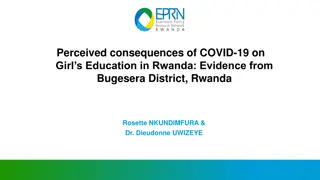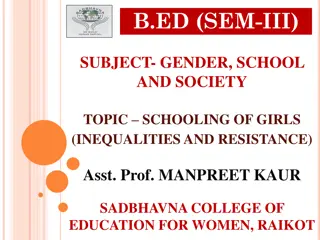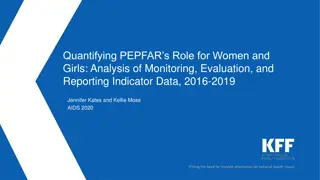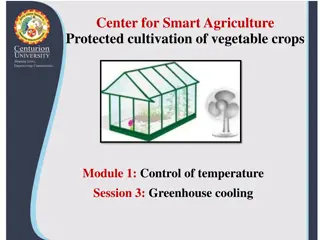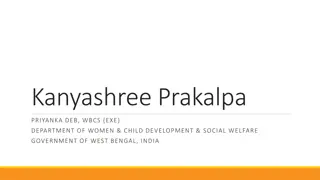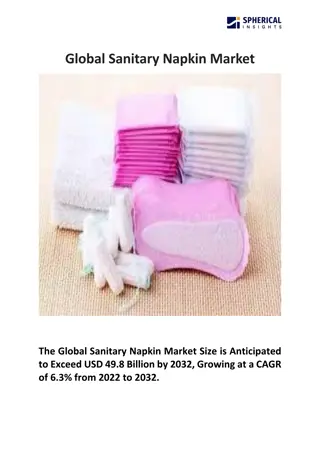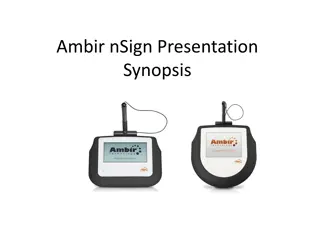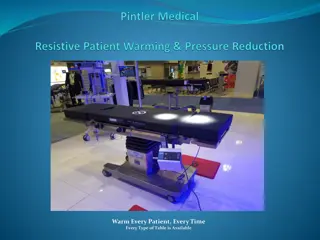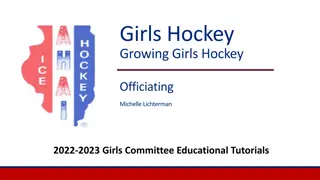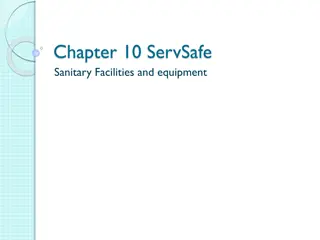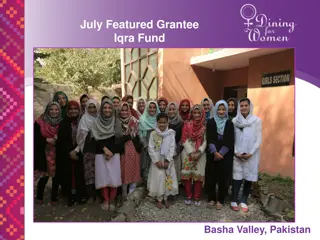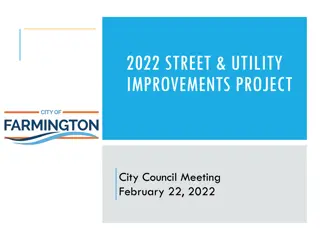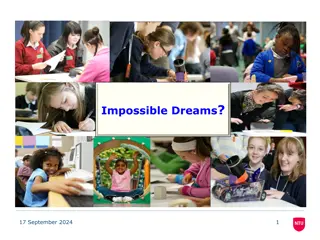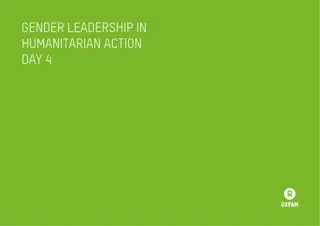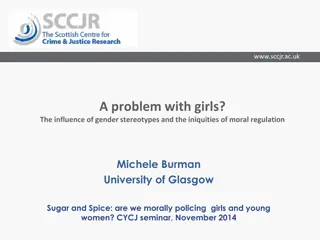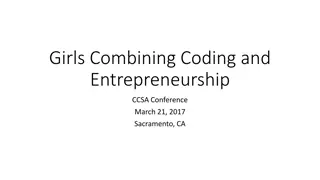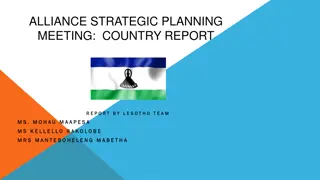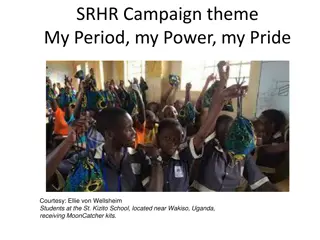Empowering Girls Through Locally-Made Sanitary Pads Project
The National Sanitation Policy aims to achieve universal access to improved sanitation and safe hygiene practices. Addressing menstrual challenges for girls in LDCs, the project trains girls to make reusable sanitary pads, promoting attendance, participation, and confidence in school, while improving sanitation and hygiene. Sustainable solutions are provided to empower girls and enhance their educational experience.
Download Presentation

Please find below an Image/Link to download the presentation.
The content on the website is provided AS IS for your information and personal use only. It may not be sold, licensed, or shared on other websites without obtaining consent from the author.If you encounter any issues during the download, it is possible that the publisher has removed the file from their server.
You are allowed to download the files provided on this website for personal or commercial use, subject to the condition that they are used lawfully. All files are the property of their respective owners.
The content on the website is provided AS IS for your information and personal use only. It may not be sold, licensed, or shared on other websites without obtaining consent from the author.
E N D
Presentation Transcript
By Ruth Kalinga Chirwa
Presentation Outline Introduction Problem statement Project objectives Locally-made sanitary pads project Achievements Challenges Way forward Conclusion Acknowledgements
Introduction The overall objective of the National Sanitation Policy (2008) is to achieve universal access to improved sanitation and safe hygiene practices whilst ensuring sustainable environmental management for economic growth. It aims at ensuring that all people own or have access to improved sanitary facilities and that they practice safe hygiene and safe recycling of liquid and solid waste for sustainable environmental management and socio-economic development. The policy advocates the use of participatory methods in delivering health and hygiene interventions. On sanitation and hygiene in rural areas, the policy s objective is to increase access to improved sanitation and to promote safe hygiene practices, new technologies, proper waste disposal and recycling of wastes.
Introduction contd To achieve this, local artisans and sanitation promoters need to be trained in the production and marketing of sanitation hardware, respectively. On gender, the policy encourages the establishment of gender sensitive mechanisms when creating user committees. On children and youths, the policy advocates early exposure to good sanitation and hygiene. It also advocates for the provision of services and facilities at a subsidized price to the poor.
Problem Statement Menstruation is one of the contributing factors to poor performance and high dropout rates among girls in LDCs. Most girls do not go to school during their monthly periods as they are afraid of staining their clothes. For those who are courageous enough and attend lessons do not participate fully in class which affect the participatory teaching and learning approach Hence Several organizations indulge themselves in assisting the girls with factory- made sanitary pads in order to minimize the problem However, this has been proved to be unsustainable and unhygienic as most schools do not have incinerators. They are also expensive as they can not be re-used. It is against this background that (FAWEMA) trained the MSG at Liwonde Secondary in Machinga district, Malawi in locally- made sanitary pads for the girls.
Project Objectives In general the project aimed at training and equipping FAWEMA MSG at Liwonde Secondary School with life skills which can enhance sanitation and hygiene at the school and at the same time improving the girls participation and performance in class more especially in science subjects. Specifically the study was conducted to:- enable the MSG make sanitary pads and pass on the knowledge to peers, daughters and future generations. make girls attend classes comfortably without worrying about un-eventualities that are to do with their menstruation. raise self-esteem of girls in class when answering questions that demand them to stand up or demonstrate something in front of other students. improve sanitation and hygiene at the school as the headteacher at the school complained of frequent blockage of toilets due to the use of sanitary pads which are bought from shops which they used to distribute to the girls.
Sanitary Pad Making Project The MSG was trained on how to make the sanitary pads using locally available materials that FAWEMA provided to the MSG for the pad making exercise. The pad is made from a piece of cloth, plastic paper and cotton wool or cloth. The sanitary pad has strings which are tied on to the waist to prevent dislocation FAWEMA asked the MSG to make the pads and sell to the students at the school and the neighboring schools. FAWEMA also suggested the price for the pads to be K100.00 each, the price which was thought to be affordable to students.
Sanitary Pad Making Project contd The MSG bought the materials for pad making which include cloth, sewing needles, tape measures, threads, plastic papers, cotton wool and pairs of cutting scissors. The exercise of pad making started on the 12thAugust 2011.
Achievements The MSG through the PTA managed to build the pit latrine which is a girl child friendly The locally made sanitary pad has helped to improve the attendance among girls as the pads help to keep the girl child in school in all seasons thus whether the girl child is menstruating or not. The MSG has also helped in the sensitization on reproductive health to the girls at the school and neighboring schools
Achievements contd The MSG has won favors from the teachers at the school as they assist the MSG by allowing other needy students to learn free at the open secondary school. Transparency and accountability. The MSG has a bank account with the First Merchant Bank , Liwonde branch, for transparency and accountability of funds.
Challenges The MSG has a big responsibility in taking care of the students who have returned back to school as some of the parents for these students still have doubts for their students while some come from the child headed households and some come from the families which are extremely poor. High number of needy students who cannot afford to pay K100.00 for the pad hence it bounces back to the MSG as a result they keep on contributing now and again to raise funds. Long distances the students travel to and from school makes it difficult to keep the changed locally made sanitary pad hence they wear the pad for a longer period that expected exposing themselves to rush.
Way forward To lobby for more funds so that MSG can increase the number of students it assists. To write proposals for the construction of the girls hostel To ask well wishers to assist in the drilling of borehole at the school. Possibility is there of having water without much problems if the borehole can be drilled because the geological of the area is much promising. For example, there are two artesian wells in distance of about 400m on both eastern and western side of the school. To negotiate with the PTA to use part of the GPF for the construction of the Incinerator.
Conclusion Locally- made sanitary pad project proved to be a success at Liwonde secondary school on the part of students. However it is not profitable to the MSG in order to support some of its activities including paying school fees and house rent for the most needy students. Hence well wishers should stretch their arms to rescue them
Challenges contd Water shortages at the school makes it difficult for the girls to observe hygienic practices such as washing themselves when they get very wet with the monthly period. Hygiene requires washing with soap _not to be shared _Drying in the sun -not inserting Lack of enough resources. FAWEMA s MSG does not have enough resources to spread this skill to neighboring schools. Hence it is hereby asking other organization to join hands in improving the hygiene of the girl child at the school and other neighboring schools through pad making training. Funding and sustainability
Acknowledgements God for his mercy. WaterAid for funding this conference The FAWEMA National Coordinator and her Office for funding the Pad making Project. FAWEMA MSG for their dedication in pad making project All teachers at Liwonde Secondary school for their support T/A Sitola GVH Kalonjere and all chiefs from the villages surrounding the school for their moral support and encouragement
Lets stop the fire of poverty which is burning the African girl child and unite in uplifting her from the circle of poverty !!! Thank you & God bless you all.




